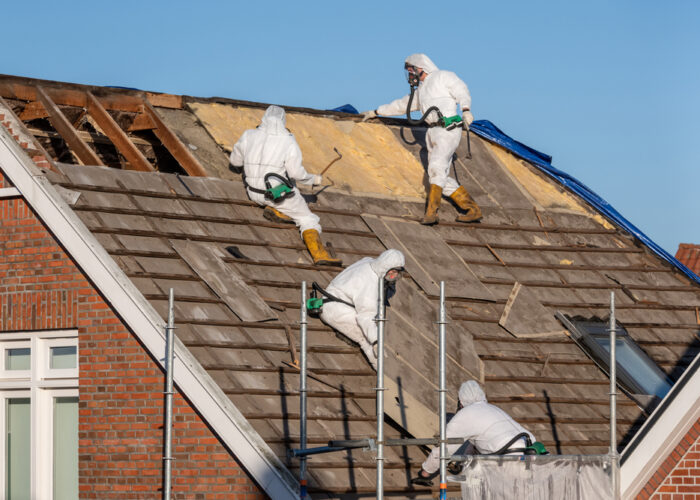
What Are the First Signs of Asbestos Exposure?
Asbestos exposure is a serious health risk that can lead to devastating consequences if not properly identified and addressed. Asbestos is a naturally occurring mineral that was commonly used in building materials, insulation, and other products for its fire-retardant and insulating properties. However, prolonged exposure to asbestos fibers can lead to serious health issues, including mesothelioma, lung cancer, and asbestosis. In order to protect yourself and your loved ones from the dangers of asbestos exposure, it is important to be aware of the early signs of exposure and take action to address any potential risks in your environment.
Understanding Asbestos Exposure
Before we discuss the signs of asbestos exposure, it’s important to understand how exposure can occur. Asbestos fibers are released into the air when asbestos materials are disturbed or damaged, such as during renovations, demolition, or regular wear and tear. Once released into the air, these fibers can be inhaled or ingested, leading to potential health risks.
Asbestos exposure is most commonly linked to occupations such as construction, mining, shipbuilding, and manufacturing, where workers may regularly come into contact with asbestos-containing materials. However, asbestos exposure can also occur in residential settings, particularly in homes built before the 1980s, when asbestos was commonly used in building materials.
Early Signs of Asbestos Exposure
The early signs of asbestos exposure are often subtle and can easily be mistaken for common respiratory ailments. However, paying attention to any persistent symptoms that may indicate exposure to asbestos fibers is important. Some of the early signs of asbestos exposure may include:
- Shortness of breath
- Persistent cough
- Chest pain or tightness
- Fatigue
- Respiratory issues such as wheezing or difficulty breathing
- Persistent hoarseness or changes in voice
- Swelling or pain in the abdomen
- Unexplained weight loss
- Clubbed fingers or toes
If you experience any of these symptoms and suspect that you may have been exposed to asbestos, it is crucial to seek medical attention and inform your healthcare provider about any potential asbestos exposure.
How to Check for Asbestos in Your Environment
If you suspect that your home or workplace may contain asbestos-containing materials, it is important to take steps to identify and address any potential risks. While asbestos is not always easy to detect visually, there are a few ways you can check for asbestos in your environment:
- Conduct a Home Inspection: If you live in an older home or building, particularly one built before the 1980s, it is important to thoroughly inspect asbestos-containing materials. Common areas where asbestos may be found include insulation, roofing materials, floor tiles, and textured ceilings.
- Hire a Professional: If you are unsure about the presence of asbestos in your home or workplace, consider hiring a professional asbestos inspector to conduct a thorough assessment. An environmental hygienist or asbestos abatement contractor can help identify asbestos-containing materials and recommend appropriate remediation measures.
- Test for Asbestos: If you suspect that materials in your home or workplace may contain asbestos, you can have them tested by a certified asbestos testing laboratory. Samples can be collected and analyzed to determine the presence of asbestos fibers in the materials.
- Be Cautious During Renovations: If you are planning renovations or construction work in an older building, take precautions to prevent the release of asbestos fibers. It is important to hire a licensed asbestos abatement contractor to safely remove any asbestos-containing materials before beginning work.
Mitigating the Risks of Asbestos Exposure
If you have identified asbestos-containing materials in your environment or suspect that you may have been exposed to asbestos, it is important to take steps to mitigate the associated risks. Some of the measures you can take to reduce the risks of asbestos exposure include:
- Avoid Disturbing Asbestos: If you suspect that materials in your home or workplace may contain asbestos, avoid disturbing them to prevent the release of asbestos fibers into the air.
- Seek Professional Help: If you need to remove or address asbestos-containing materials, hire a licensed asbestos abatement contractor to ensure safe and proper removal.
- Monitor Your Health: If you have been exposed to asbestos or suspect exposure, monitor your health for any changes or symptoms that may indicate asbestos-related illnesses.
- Follow Safety Guidelines: If you work in an industry where asbestos exposure is a risk, make sure to follow safety guidelines and wear appropriate protective equipment to prevent exposure.
- Educate Yourself: To protect yourself and your loved ones, stay informed about the risks of asbestos exposure and familiarize yourself with the signs and symptoms of asbestos-related illnesses.
Contact Ahold of Mold Environmental Today
If you suspect that your home or workplace may be at risk for asbestos exposure, don’t wait to take action. Ahold of Mold Environmental is here to help you identify and address any potential asbestos risks in your environment. Our team of environmental hygienists, remediation contractors, and indoor air quality experts can provide comprehensive asbestos testing, inspection, and remediation services to ensure the safety of your indoor environment.
We are committed to providing top-quality mold and water damage remediation services to homeowners and businesses in Buffalo, Kenmore, and Erie County, NY. With over two decades of experience and expertise in the field, our team is dedicated to helping our clients achieve safe and healthy indoor environments.
If you have concerns about asbestos exposure in your home or workplace, don’t hesitate to contact Ahold of Mold Environmental today at 716-898-8143 to learn more about our services and schedule an on-site mold inspection and indoor air quality test. Don’t take chances with asbestos exposure – trust the experts at Ahold of Mold Environmental to keep you and your loved ones safe.
Categorised in: Asbestos


